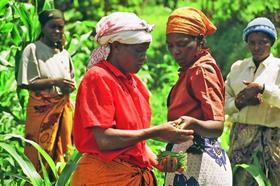
Sustainable food systems are “within our control” and can be achieved through addressing climate change and helping small-scale producers in developing countries to be more productive.
That was the message of the keynote address by Dr Kanayo Nwanze, former president of the International Fund for Agricultural Development (IFAD) and FAO advisor, speaking at the Sustainable Foods Summit, held in Amsterdam today (2 June).
Speaking on the day after news that US president Donald Trump has pulled out of the landmark Paris climate agreement, Nwanze said keeping climate change separate from discussions on food systems is “wrong”.
“If there was any moment for sustainable food systems, that moment is now,” he said.
“If we think of the impact of climate change, there’s going to be more droughts and more flooding. Human kind will not survive with the same systems that we’ve had up until now.”
As well as the direct impacts from climate-related disasters, Nwanze said that without changing current food systems and addressing inequalities, the problems linked to migration will continue, as migrants leave developing countries in search of better opportunities.
Nwanze said the key to transforming global food systems lies with small-scale producers, who he said are responsible for 90 per cent of the world’s farms. Agricultural development should tackle productivity and other barriers such as access to land and finance, rather than simply increasing production, he said.
“Most commercial food systems focus on consumer tastes. Food security debates focus on increased production. But today, we produce enough food for every man, woman and child on this planet – this is the paradox.
“We produce enough food, but in the developing world people are going hungry. The problems of distribution, access to land and financial services are still the major bottleneck.”
Diversification in crop production and consumer diets will also help the shift to sustainable food systems, Nwanze said, stressing that the capacity for change lies with everyone.
“Food systems are not made by themselves, they are made by us. We can make our food systems sustainable if we care enough,” he said.



